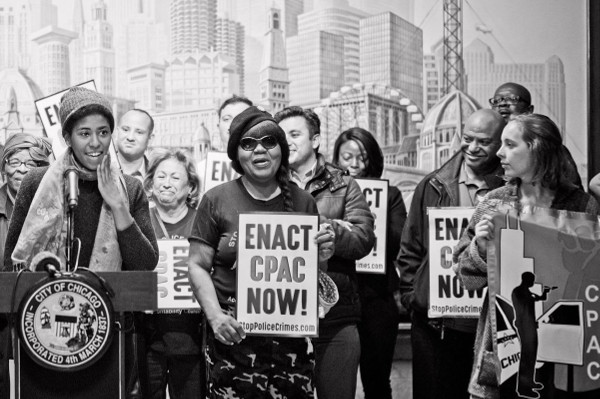
PHOTO/BOB SIMPSON
CHICAGO, IL — Upon hearing the guilty verdict read for Chicago police officer Jason Van Dyke in the murder of Laquan McDonald, a crowd of nearly a thousand marched through the streets of downtown Chicago on October 5, both to celebrate and to continue the mass movement for police accountability in the nation’s third largest city. Standing outside City Hall after the verdict was announced, Frank Chapman, Field Organizer of the Chicago Alliance Against Racist and Political Repression, declared: “This is the beginning of the changes we’ve needed in this city for a long, long time!”
On the night of October 20, 2014, Officer Van Dyke, who is white, was captured on a police dashcam video shooting repeatedly at Laquan McDonald. The 17-year-old Black youth would be shot a total of 16 times, almost all while he lay dying on the street. The circumstances of the brutal murder were covered-up, including through falsified police accounts from Van Dyke and his partners on the scene and through the suppression of the dashcam video by the State’s Attorney and Mayor Emanuel’s Office to ensure the mayor’s re-election.
The work of activists and journalists forced the city to publicly release the video and indict Van Dyke—nearly 400 days after the shooting occurred. Van Dyke went on trial on September 5, 2018, the first white police officer in the history of Chicago charged with first-degree murder of a Black youth while on duty. In true Chicago fashion, only one African-American citizen was selected to serve on the twelve-person jury. On October 5, 2018, Van Dyke was found guilty in a historic verdict—the last time a Chicago police officer had been found guilty of murder was nearly 50 years ago.
A coalition led by the Chicago Alliance Against Racist and Political Repression, Black Lives Matter Chicago, Black Youth Project 100, the Arab-American Action Network and others has been at the forefront of the movement to prosecute and convict Officer Van Dyke, including organizing Black Friday Boycotts on Michigan Avenue in 2016 and 2017, as well as mass rallies at the start of the Van Dyke trial and at City Hall the day the verdict was announced. In their unwavering demand for justice for Laquan, right through to the conviction of Van Dyke, the people in Chicago have shown their readiness to democratically transform a police accountability system that will not reform itself and instead continues to turn a blind eye to the false imprisonment and murder of Black and brown community members.
The thousand that marched after Van Dyke’s historic conviction demanded community control of the Chicago police as the next step in this mass movement for police accountability, chanting “CPAC Now!” The Civilian Police Accountability Council (CPAC) ordinance, introduced into city council in 2016, would replace the unelected Police Board with an all-elected council of representatives from each police district. They will be accountable directly to the people and have the power to investigate and fire police officers. The movement for CPAC already counts on 55,000 supporters and was the dominant voice at community hearings on police accountability this past summer in Chicago. This February, during elections for city council, the movement for CPAC is expected to usher in a new wave of elected officials who understand it’s time for community control of the police as the answer to ending police impunity and to creating racial justice in Chicago.
Activist calls for voting out city council members who helped cover-up
